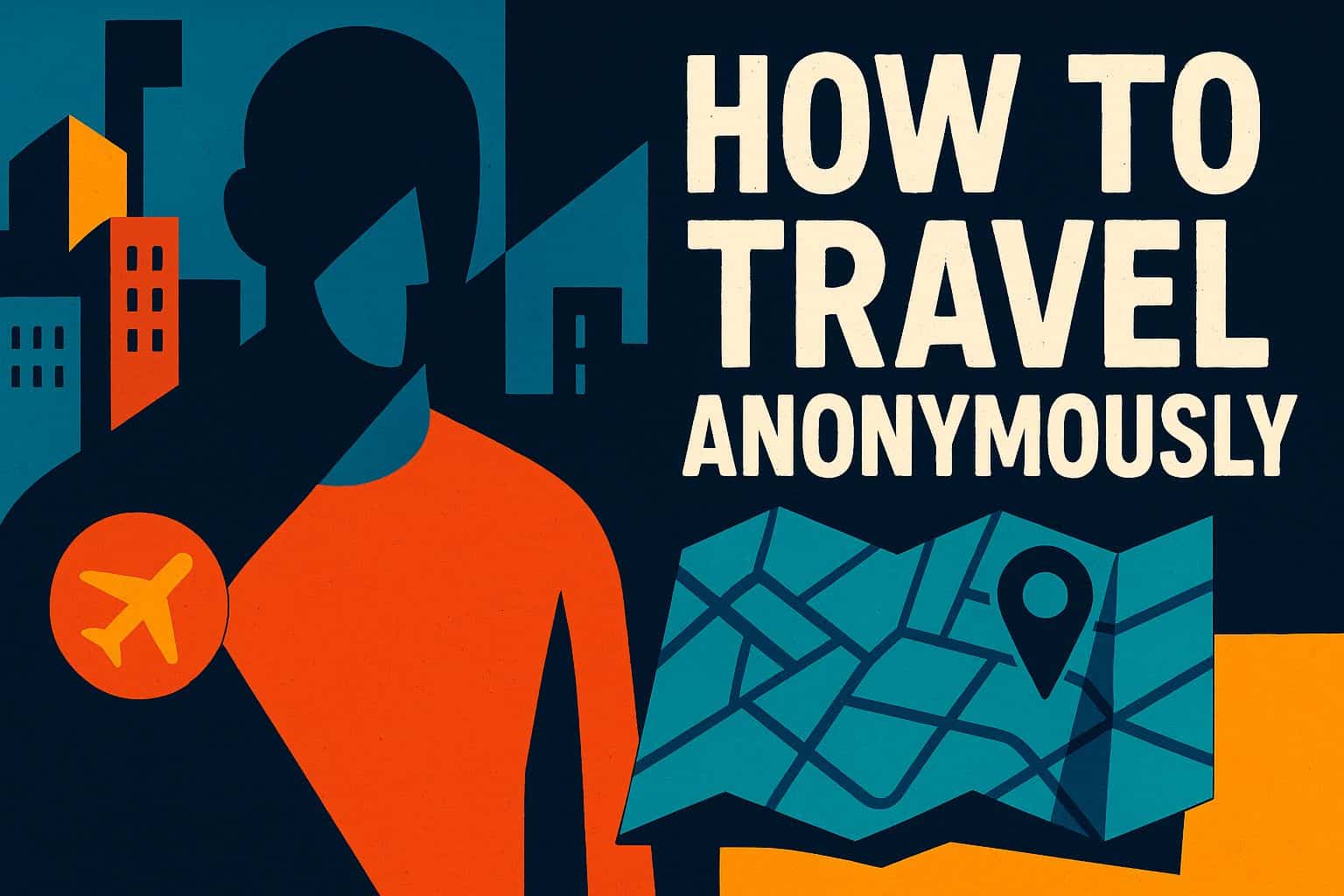Your digital footprint follows you everywhere you go, even on vacation. Privacy-conscious travelers face constant tracking through smartphones, loyalty programs, and public Wi Fi networks that monitor their every move.
This guide reveals how to travel anonymously using six essential privacy steps that protect your personal data and keep your adventures off the radar. Ready to disappear?
Key Takeaways
Use VPN services with no-logs policies and Tor browser together to hide your IP address and encrypt internet traffic.
Anonymous search engines like DuckDuckGo and Startpage block tracking while encrypted messaging apps protect your communications from surveillance.
Pay with cash-purchased prepaid cards, Paysafecard, or Monero cryptocurrency to avoid leaving digital payment trails during travel.
Choose boutique hotels and guesthouses that accept cash payments and require minimal identification over major hotel chains.
Enable full-disk encryption on all devices and research your destination’s surveillance laws and data collection practices before traveling.
Table of Contents
Enhancing Digital Privacy

Your digital footprint reveals more about your travel plans than you might think. Smart travelers use specific tools and techniques to mask their online activities, protect their data, and keep their movements private from prying eyes.
How can I use a VPN and Tor Browser for privacy?

A virtual private network (VPN) creates an encrypted tunnel between your device and the internet, hiding your real IP address from websites and ISPs. The Tor browser adds multiple layers of encryption by routing your traffic through several servers, making anonymous web browsing nearly impossible to trace.
- Choose a VPN service with a strict no-logs policy and 256-bit AES encryption to protect your internet usage from surveillance and tracking.
- Install NordVPN or Surfshark on all your devices since these providers offer strong data protection and reliable anonymous browsing capabilities.
- Download the official Tor browser from the Tor Project website to access .onion sites and browse the web with maximum privacy protection.
- Enable Tor Over VPN by connecting to your VPN service first, then launching the Tor browser to hide your IP address from entry nodes.
- Accept slower connection speeds as a trade-off since both the virtual private network and Tor browser reduce browsing speed for enhanced security.
- Clear cookies and browsing history regularly in both your VPN client and Tor browser to prevent websites from tracking your online activities.
- Use incognito mode in combination with your privacy tools to prevent local storage of search history and user profiles on your device.
- Configure two-factor authentication (2FA) on your VPN account to add an extra security layer protecting your anonymous web browsing setup.
- Test your setup by checking your IP address and location on privacy-focused websites to confirm your virtual private network encrypts your connection properly.
What are the best anonymous search engines to use?
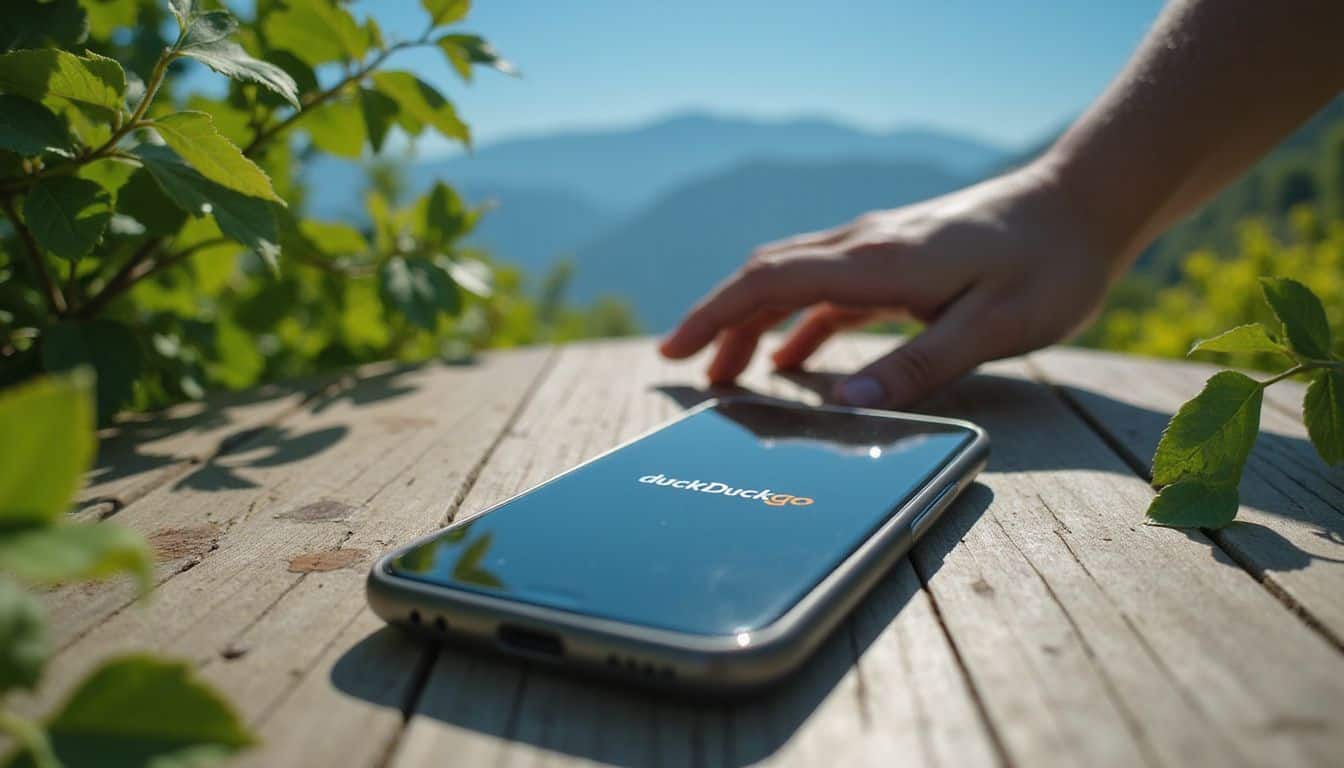
DuckDuckGo is an excellent anonymous search engine that does not track users or sell data to third parties. I’ve used DuckDuckGo for years during my travels, and it blocks trackers while enforcing secure connections across all searches.
The search engine maintains no database of user queries, making it ideal for researching destinations without leaving digital footprints.
Startpage is another great option that removes tracking cookies and provides Google results without surveillance. Qwant delivers European-based search results while adhering strictly to privacy laws, and Swisscows provides family-friendly results with zero data collection.
Ecosia donates ad revenue to tree-planting initiatives while protecting your search privacy, making it suitable for eco-conscious travelers who want secure communication tools. These private browsing alternatives work well on Android devices and tablets, ensuring your travel research remains completely anonymized—whether you’re planning a trip or even something more discreet like deciding to book a private escort in LA today.
Privacy is not about hiding something. It’s about protecting everything.
How do encrypted tools secure my communication?

After securing your searches with anonymous engines, protecting your communications becomes the next critical step. Encrypted messaging apps create a digital fortress around your conversations, making them unreadable to anyone except you and your intended recipient.
Signal, WhatsApp, and Telegram use end-to-end encryption to shield your information from unauthorized users. This technology scrambles your messages into complex codes that only your device and the recipient’s device can decode.
Even if hackers intercept your communications on public internet networks, they see meaningless jumbled text instead of your actual conversations. I’ve tested these messaging apps during my travels through various countries, and they consistently protect sensitive travel details like hotel addresses and meeting locations from prying eyes.
Discreet Booking and Payments

Smart travelers know that booking trips and making payments can leave digital footprints everywhere. Your credit card statements, email confirmations, and reservation records create a trail that anyone can follow… but you can break this chain with the right approach.
How do I use pseudonyms for travel reservations?

Pseudonyms must match valid travel documents for anonymous travel to work legally. Airlines and hotels have strict policies about name verification that you need to follow.
- Create legal name variations that match your passport exactly, using middle names or initials instead of completely fake identities for your travel reservations.
- Book accommodations through third-party platforms that allow guest name flexibility, but ensure your pseudonym appears on official documentation when checking in.
- Use prepaid debit cards linked to your legal pseudonym variation to maintain payment consistency across all booking platforms and avoid verification issues.
- Register alternate email addresses in your inbox using the same name variation you plan to use for travel bookings and reservations.
- Obtain secondary identification documents like library cards or membership cards in your chosen pseudonym to support your identity during check-ins.
- Practice using your pseudonym consistently across all platforms, from social media platforms to booking confirmations, maintaining adherence to your chosen identity.
- Research destination-specific requirements for name matching policies, as some countries have stricter data privacy laws that affect pseudonym usage.
- Keep your pin number and payment details secure by using different pins for cards associated with your travel identity versus personal cards.
Anonymous payment methods become crucial once you establish your travel identity.
What anonymous payment methods can I use while traveling?
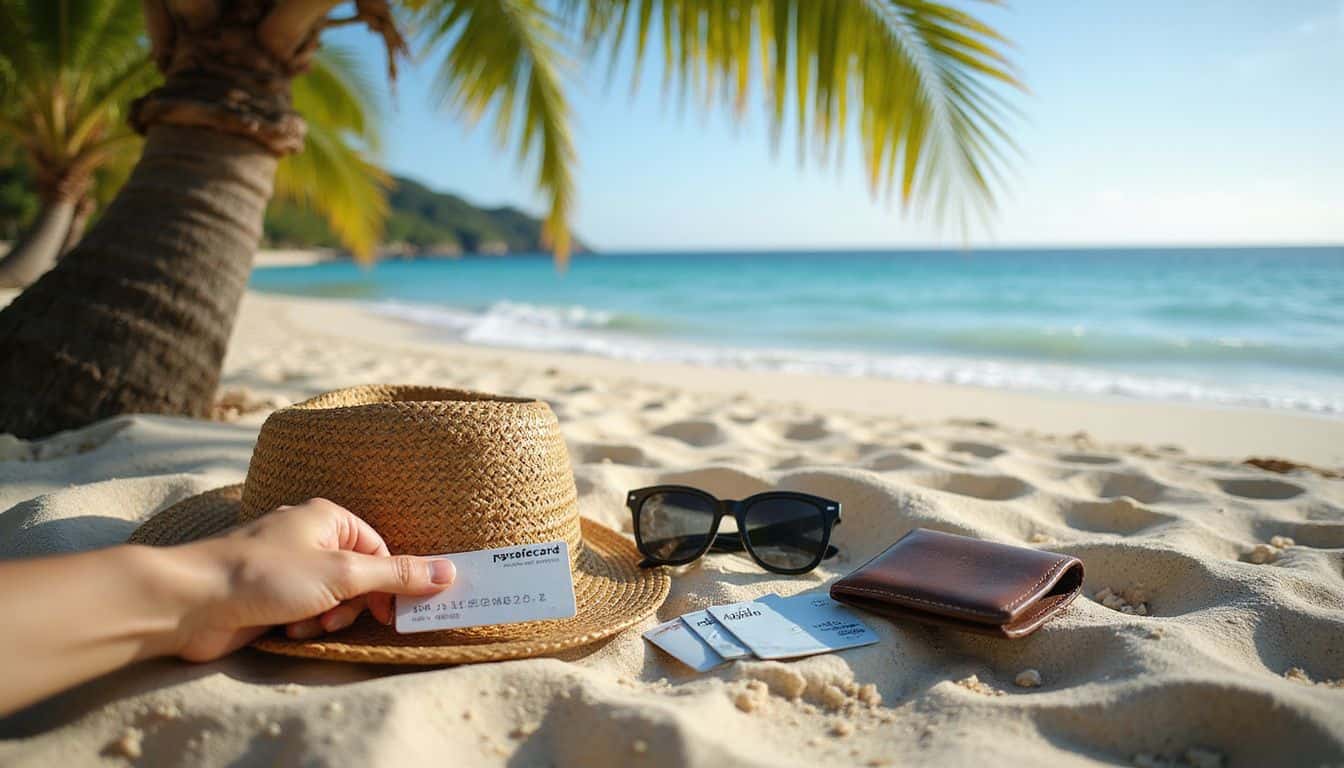
Securing reservations with fake names works best when you pair it with untraceable payment methods. Smart travelers know that your payment trail reveals more about your location and identity than almost any other digital footprint.
- Paysafecard for Complete Anonymity: Purchase these cards with cash at retail stores, then use the 16-digit PIN for online bookings. This method leaves zero digital traces since you never link personal banking information to transactions.
- Monero and Privacy-Focused Cryptocurrencies: Use Monero for the highest level of payment privacy among digital currencies. Unlike Bitcoin, Monero masks transaction amounts, sender addresses, and recipient details completely.
- Cash-Recharged Prepaid Cards: Buy prepaid debit cards with cash, then reload them using cash at participating retailers. These cards work like regular debit cards but disconnect your real identity from purchases.
- Cryptocurrency ATMs for Quick Access: Find Bitcoin ATMs that accept cash without requiring ID verification for smaller amounts. Convert your crypto to local currency or use it directly at crypto-accepting merchants.
- Gift Cards as Payment Bridges: Purchase gift cards with cash, then use them to buy other prepaid cards or make online purchases. This creates an extra layer between your identity and the final transaction.
- Cash-Only Local Transactions: Stick to cash payments for accommodations, meals, and transportation whenever possible. Many comprehensive guide to traveling anonymously hidden gems accept only cash anyway.
- Masked Credit Card Services with Limitations: Services like Privacy.com create virtual card numbers, but they still record your real data internally. Use these only for low-stakes purchases where complete anonymity isn’t critical.
- Traveler’s Checks for Old-School Privacy: Though outdated, traveler’s checks bought with cash still work at many locations. They provide a paper trail that’s harder to track digitally than electronic payments.
Staying Low Profile While Traveling

Mastering the art of invisibility while traveling requires a delicate balance between preparation and spontaneous adaptation. Smart travelers know that blending in goes far beyond choosing the right clothes—it’s about controlling your digital footprint, managing your behavior, and making calculated decisions that keep you off the radar.
How can I blend into local surroundings effectively?
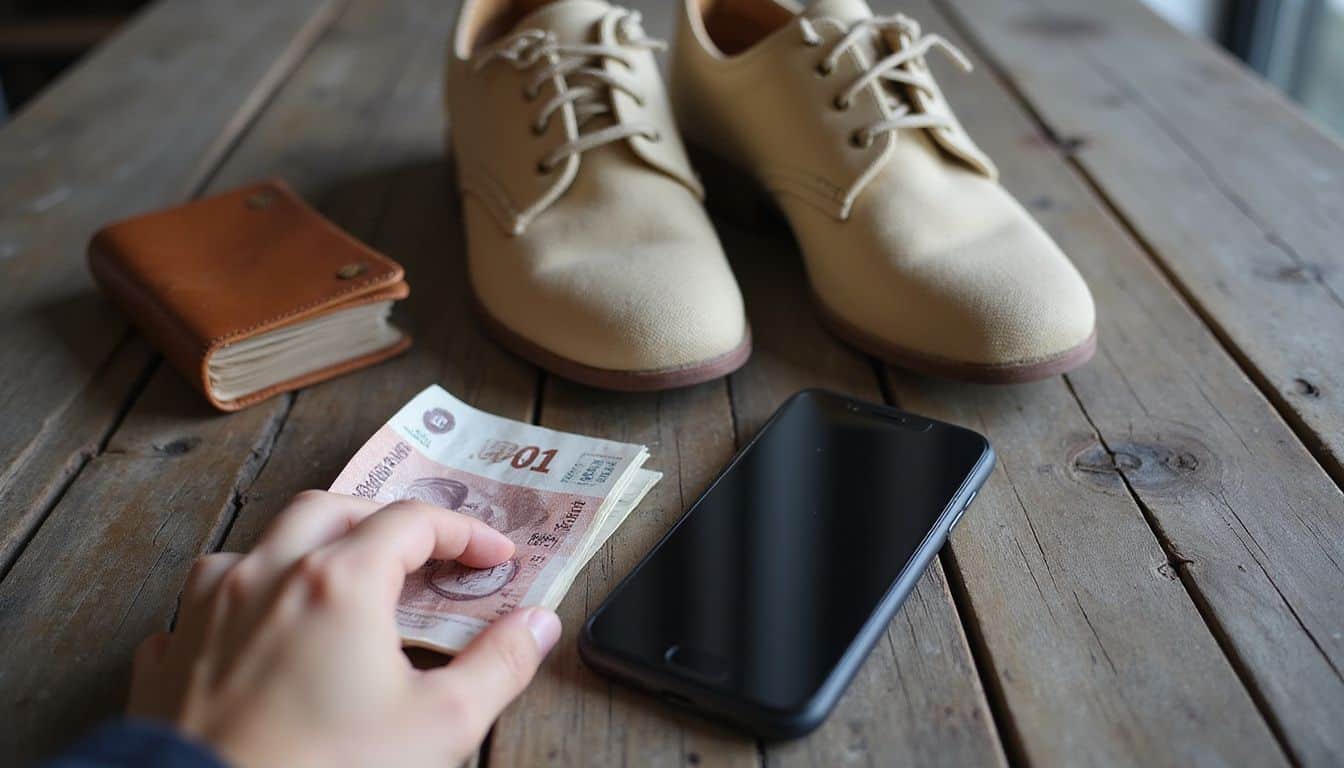
Blending into local surroundings starts with your appearance and behavior. Dress according to local customs, which means researching typical clothing styles before you arrive. Locals spot tourists instantly by their bright colors, brand logos, and inappropriate footwear.
Choose neutral colors that match what residents wear daily. Familiarize yourself with local currency to avoid fumbling with bills at checkout counters. This simple step prevents you from looking like an obvious outsider counting foreign money.
The best way to remain invisible is to become part of the scenery.
Master basic local languages and customs through language apps or phrase books. Even knowing “hello,” “thank you,” and “excuse me” helps you navigate conversations naturally. Adapt non-verbal communication to local norms since gestures vary dramatically between cultures.
Observe how locals walk, sit, and interact before copying their body language. Use incognito browsing on your devices to research cultural etiquette without leaving digital traces.
Secure messaging apps help you communicate with contacts back home without exposing your location through standard texting platforms.
Why should I avoid sharing real-time updates on social media?
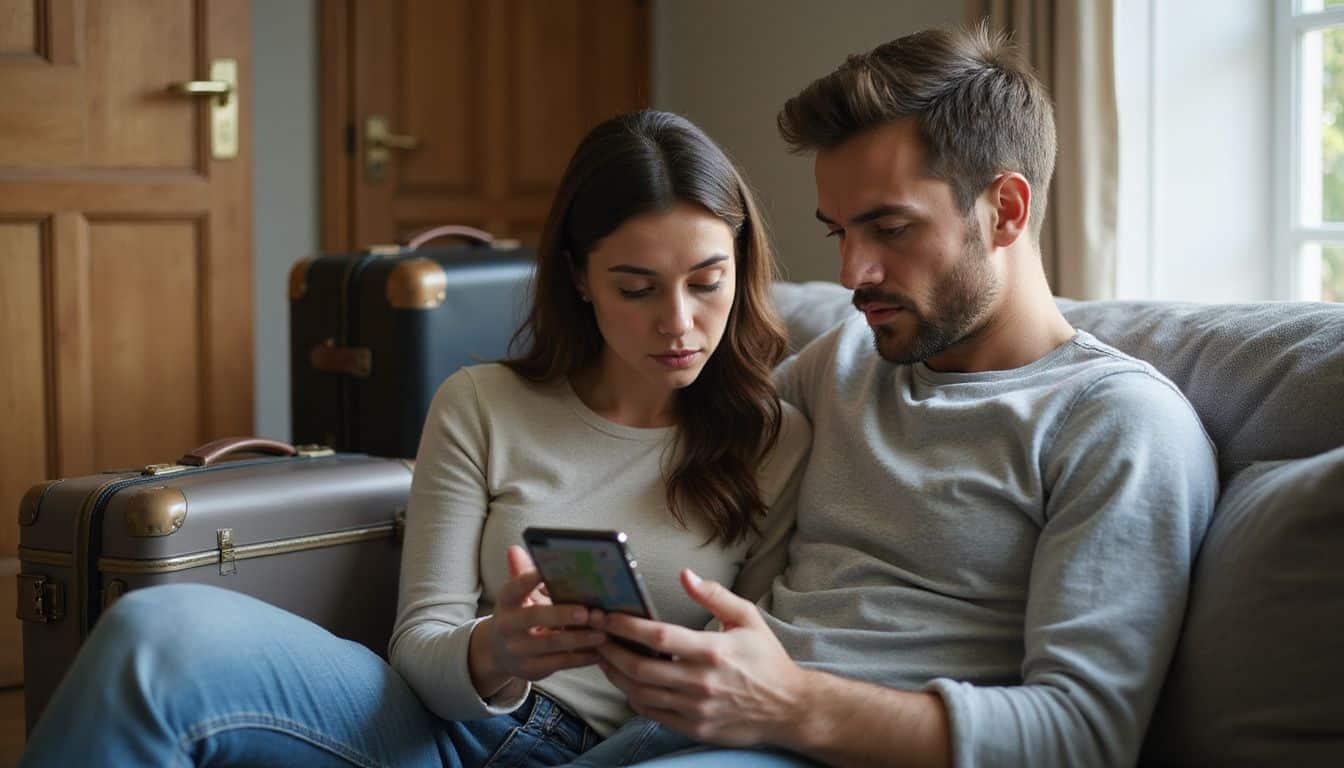
Real-time social media posts create serious cybersecurity risks that most travelers overlook. Posting your current location, flight details, or hotel check-ins gives criminals a digital roadmap to your exact whereabouts.
Sharing real-time updates increases exposure to cybersecurity risks, making you a target for theft, stalking, or worse. Bad actors can track your movements, predict your schedule, and exploit your vulnerability while you’re away from home.
Your empty house becomes a prime target for burglars who monitor social feeds for travel announcements. Statistics show that homes without security systems are 300% more likely to be burglarized, and your posts essentially advertise an unoccupied property.
In 2021, approximately 619,811 burglaries were reported in the U.S., with many linked to social media oversharing. Smart criminals use your vacation photos as evidence that your home sits empty, your valuables are unguarded, and your return date is days away.
Travel insurance won’t cover losses that result from your own digital carelessness.
Choosing Secure Accommodations

Your choice of lodging can make or break your anonymous travel plans… and most travelers pick the wrong places for all the wrong reasons. Smart privacy-focused travelers know that boutique hotels, small guesthouses, and Airbnb alternatives often provide better anonymity than major hotel chains that demand extensive documentation and maintain detailed guest databases.
What are privacy-focused guesthouses or boutique stays?
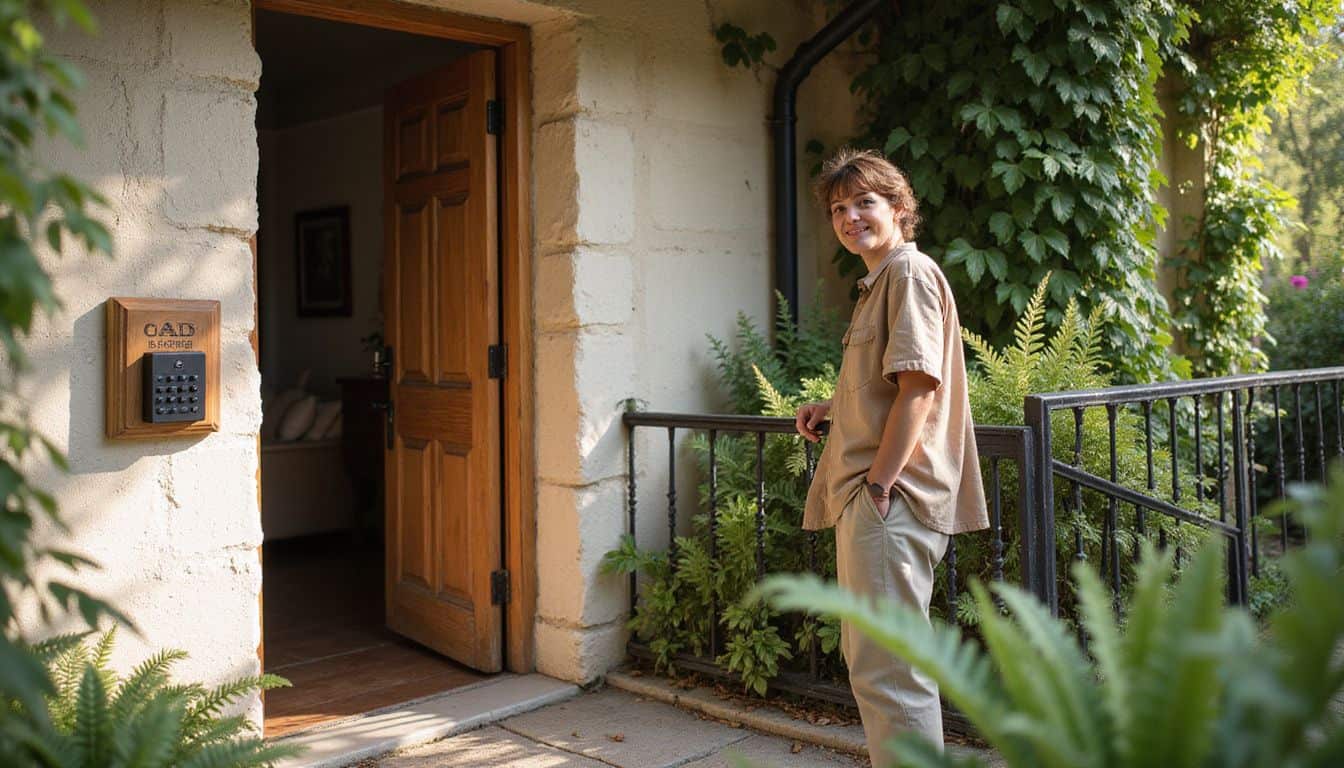
Boutique hotels prioritize guest privacy with a personalized experience that goes far beyond standard accommodations. These smaller establishments offer secure entry systems and data protection measures that keep your information safe from prying eyes.
Staff training on privacy protocols ensures employees understand the importance of discretion, while balancing attentive service with guest privacy enhances comfort throughout your stay.
Privacy-focused guesthouses create an environment where you can truly disappear from the digital world. Many of these establishments accept cash payments, require minimal identification, and avoid connecting to major booking platforms that track your movements.
I’ve stayed at several boutique properties in Prague and Amsterdam where the front desk staff never asked for my passport copy, and the Wi-Fi networks used generic names that couldn’t be traced back to specific rooms.
The best privacy comes from places that treat anonymity as a luxury service, not a suspicious request.
How can I add extra security measures to my room?
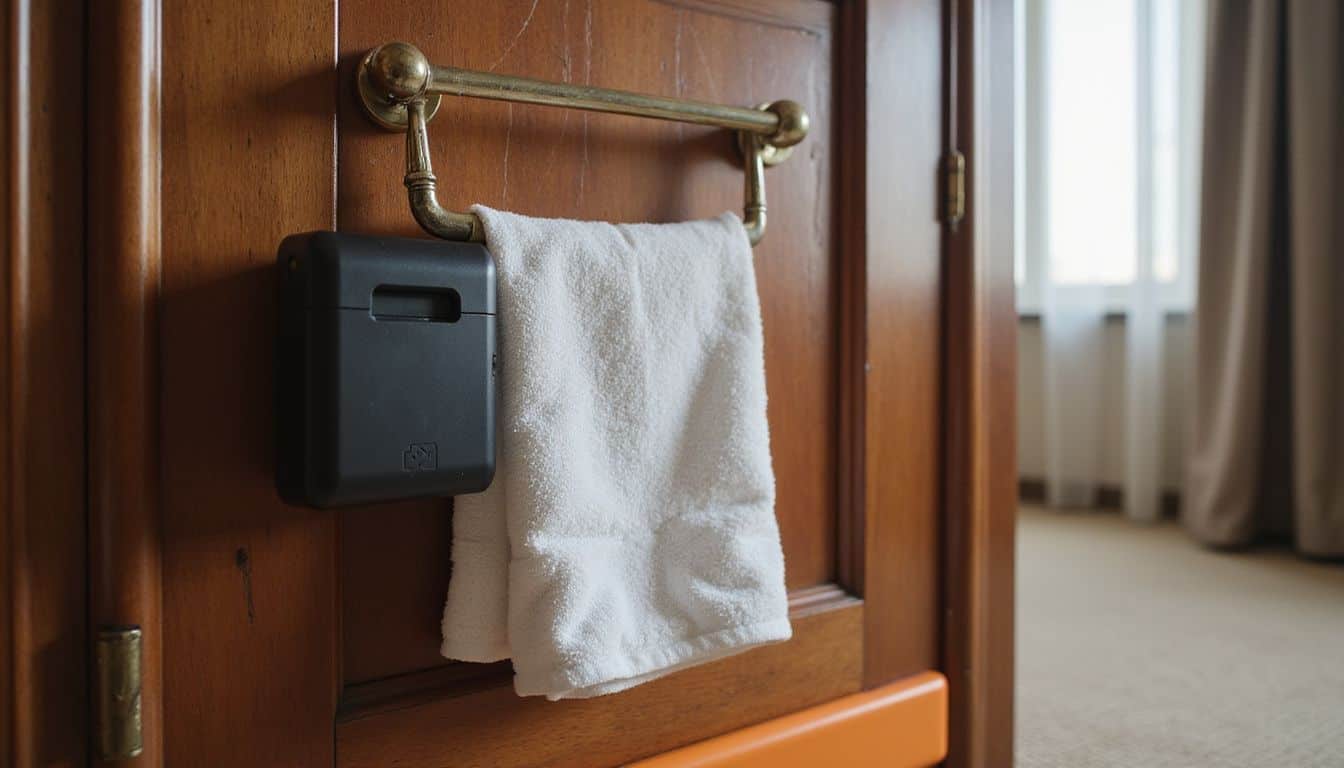
Hotel rooms often lack proper security features that protect your privacy and belongings. Smart travelers add their own protection layers to create a secure environment.
- Inspect the room for safety features and ensure all locks work – Test every lock mechanism on doors and windows before settling in. Check that deadbolts engage fully and door chains function properly.
- Use a towel in the door safety latch – Fold a thick towel and wedge it into the door’s security latch mechanism. This prevents anyone from opening the door even with a key card.
- Pack your own doorstop – Bring a rubber doorstop or portable door alarm from home. Place it firmly under the door to block entry attempts while you sleep.
- Hang the do-not-disturb sign – Display the sign immediately after checking in and keep it there throughout your stay. This reduces unwanted visits from housekeeping and potential intruders.
- Install a portable door lock – Carry a travel door lock that fits over existing hardware. These devices provide extra security without damaging hotel property.
- Cover the peephole from inside – Place tape or a small piece of paper over the door’s peephole. This prevents people from looking into your room from the hallway.
- Check for hidden cameras – Scan the room with your phone’s flashlight for unusual reflections. Pay special attention to smoke detectors, mirrors, and electrical outlets.
- Secure sliding doors and windows – Place a wooden dowel or metal bar in the track of sliding glass doors. This prevents them from being opened from outside.
- Use a white noise app – Run a noise generator on your phone to mask conversations and activities. This prevents eavesdropping through thin walls or doors.
Pre-Trip Security Preparations

Before you pack your bags, you need to lock down your digital life and research potential threats at your destination. Smart travelers spend time hardening their laptops, phones, and tablets while studying local surveillance laws, internet restrictions, and privacy risks they might face abroad.
How do I protect my electronic devices and data?

Protecting your devices and data becomes critical for anonymous travel. Smart preparation prevents border agents and malicious actors from accessing your private information.
- Implement full-disk encryption on all devices using BitLocker for Windows or FileVault for Mac. This protects your data even if someone steals your laptop or phone.
- Securely delete unnecessary data before traveling by using tools like DBAN or BleachBit. Empty trash folders and browser histories completely to remove traces.
- Create a clean travel profile on your devices with minimal apps and data. Install only essential software you need for your trip.
- Document interactions with border agents by writing down their names, badge numbers, and questions asked. Keep these notes separate from your devices.
- Adjust privacy settings on social media accounts to maximum security levels. Disable location tracking and remove personal details from profiles.
- Use encrypted messaging apps like Signal or Wire for all communications. Delete standard SMS apps that store messages in plain text.
- Enable remote wipe capabilities on smartphones and tablets through Find My Device or similar services. This lets you erase data if devices get confiscated.
- Store sensitive files in encrypted cloud storage like SpiderOak or Tresorit. Access them only through secure connections after you arrive.
- Disable automatic cloud syncing for photos, documents, and app data. Manual control prevents accidental uploads of sensitive information.
What privacy concerns should I research about my destination?

Different countries collect varying amounts of personal data from tourists, and some nations have weak privacy laws that put your information at risk. Research your destination’s data protection regulations before you travel; countries without GDPR or CCPA-style frameworks often allow businesses to share tourist data freely with third parties.
Check if your destination requires biometric data collection at borders, hotels, or tourist attractions, as this information can be stored indefinitely.
Local surveillance practices vary dramatically between countries, so investigate whether your destination uses facial recognition systems, monitors internet traffic, or requires registration at accommodations.
Some nations mandate that hotels report guest information to authorities within hours of check-in. I learned this firsthand during a trip to Southeast Asia, where my hotel required passport scans and detailed travel plans that were immediately shared with local police.
Understanding these requirements helps you prepare appropriate countermeasures and decide whether maintaining anonymity in daily life practices need adjustment for your specific destination.
How Will Anonymous Travel Evolve in 2025?

Anonymous travel faces a major shift as 2025 approaches. Legal anonymity in travel is increasing by 2025, creating new opportunities for privacy-focused travelers. Second citizenship schemes and lawful identity changes are rising, giving tech-savvy individuals more options to travel under different legal identities.
Private aviation is expanding for more privacy, offering wealthy geeks exclusive routes that bypass traditional airport screening. These developments create a two-tier system where those with resources can access premium anonymity services, while budget travelers must rely on digital tools and careful planning.
Surveillance technology presents the biggest challenge to anonymous movement. Currently, 93% of global commercial airports use biometric surveillance, making facial recognition nearly unavoidable at major hubs.
Smart travelers will need to adapt by choosing smaller regional airports, using ground transportation across borders, or investing in cosmetic alterations that fool recognition systems.
Cryptocurrency adoption will accelerate as governments crack down on cash transactions, forcing anonymous travelers to master blockchain-based payment methods. Virtual reality meetings may reduce business travel needs, while encrypted communication apps become essential for coordinating movements without leaving digital breadcrumbs.
People Also Ask
What does traveling anonymously actually mean?
Anonymous travel means moving from place to place without leaving digital traces or personal data trails. You hide your identity, location, and activities from governments, companies, and other tracking systems.
Why should someone consider anonymous travel methods?
Privacy protection keeps your personal information safe from data collectors and surveillance networks. Anonymous travel also prevents targeted advertising, identity theft, and unwanted government monitoring during your trips.
What are the most important privacy steps for anonymous travel?
Use cash instead of credit cards, avoid social media posts, and choose private transportation options. Turn off location services on your devices and consider using a VPN for internet access.
Can you travel completely anonymously in today’s world?
Complete anonymity is difficult but not impossible with proper planning and tools. You’ll need to sacrifice some convenience, but dedicated travelers can significantly reduce their digital footprint and maintain strong privacy protection.
References
https://www.comparitech.com/blog/vpn-privacy/tor-vpn/
https://www.security.org/vpn/anonymity/
https://www.pandasecurity.com/en/mediacenter/best-private-search-engines/ (2025-01-31)
https://www.tandfonline.com/doi/full/10.1080/13600834.2024.2404280
https://www.sciencedirect.com/science/article/pii/S0267364923000146
https://www.eatlivefoodie.com/how-to-travel-anonymously/
https://www.privacy.com/blog/anonymous-payment-methods
https://proprivacy.com/privacy-service/guides/safe-anonymous-online-payment-methods (2024-06-24)
https://www.workaway.info/en/stories/travel-like-a-local-blending-in
https://solotravelerworld.com/solo-travel-safety-blending-in/ (2024-09-23)
https://blackcloak.io/social-media-and-travel-be-careful-of-what-you-share/
https://www.thrillist.com/news/nation/location-sharing-social-media-advice-experts-safety (2024-06-10)
https://tangymgmt.com/blog/guest-privacy-issues-in-hotel-management/
https://www.emerald.com/insight/content/doi/10.1108/ijchm-11-2020-1329/full/html
https://www.eff.org/wp/digital-privacy-us-border-2017
https://www.athensjournals.gr/tourism/2025-12-1-2-Mchunu.pdf
https://www.security.org/resources/protecting-information-while-traveling/ (2024-06-12)
